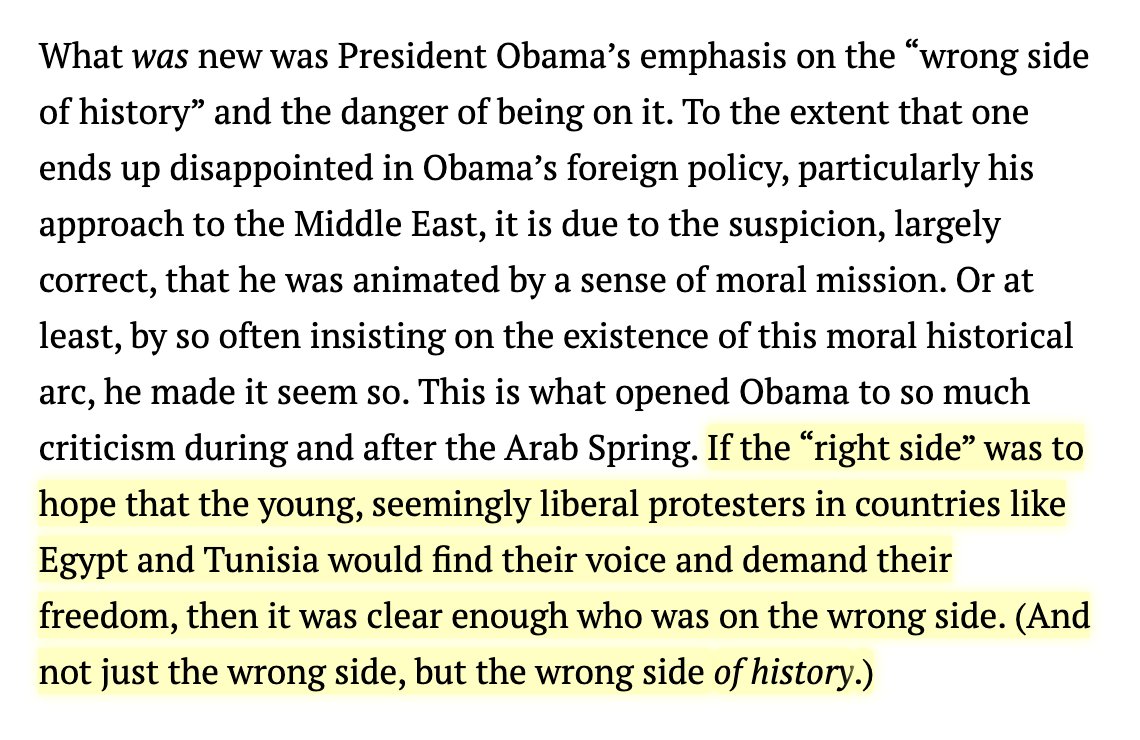
A thread on the coup attempt in Tunisia
What's happening in Tunisia is just as frightening as it sounds. And the US response is just as shaky as you might expect, bringing back memories of President Obama's disregard for Egyptian democracy during the 2013 coup
What's happening in Tunisia is just as frightening as it sounds. And the US response is just as shaky as you might expect, bringing back memories of President Obama's disregard for Egyptian democracy during the 2013 coup
If you're looking for the best overview of #Tunisia's coup attempt and the events leading up to it, read my colleague @sh_grewal's clear, concise analysis for @BrookingsFP. It makes for a chilling read
brookings.edu/blog/order-fro…
brookings.edu/blog/order-fro…
White House Press Secretary @jrpsaki's response to the dismantling of the only Arab Spring success story is as embarrassing as it is unsurprising. There's really no excuse for a response as mealy-mouthed as this. If you have nothing to say, don't say it
washingtonpost.com/opinions/2021/…
washingtonpost.com/opinions/2021/…

You might remember Jen Psaki's moment after Egypt's coup when she infamously said "we have determined we are not going to make a determination" about whether to call it a coup. This is the bold thinking present on the Biden team
(This is not a joke. She actually said that)
(This is not a joke. She actually said that)
This by @FadilAliriza is helpful insofar as it explains what coup sympathizers are thinking. Unfortunately, Aliriza seems to misunderstand the point of democracy. A government being bad and ineffective has no bearing on whether overthrowing is justified
mei.edu/publications/w…
mei.edu/publications/w…
One of the mistakes Americans and Arabs alike kept on making during the Arab Spring was selling democracy as something it wasn't. It wasn't about addressing poverty or unemployment or improving public services. Those things *can* happen but they are not intrinsic to democracy
Despite Biden's lofty pro-democracy rhetoric, Biden's foreign policy team has always been weakest on democracy promotion. This is its first real test in the Arab world. Let's hope in the coming days, Biden's top advisors can readjust their response. The time to do that is today
Credit where credit is due: The European Union also dropped the ball on Tunisia. Tunisia was the one case where they could have had genuinely constructive engagement at relatively low cost and risk
https://twitter.com/b_judah/status/1419650676657897481?s=20
What can the U.S. actually do? If Tunisia's president doesn't begin reversing course, Biden should threaten in clear, unmistakable a terms a full—not partial—suspension of aid. Partial aid suspensions don't generally work, since they confuse and dilute American leverage
Partial aid suspensions are also self-undermining, since they communicate to target governments that the U.S. is hedging its bets and is unwilling to follow through on its own stated commitments
Half measures are the worst of both worlds. They alienate the government in question without actually exercising leverage. Little is accomplished besides posturing. If you're going to alienate a government, own it and make it count
Yes, suspending aid to Tunisia is risky. But all bold policy action is risky (otherwise it wouldn't be bold). And we know that *not* threatening aid seems almost certain to lead to an undemocratic result. So one option, while risky, is much more promising than the other
There are legitimate concerns that threatening aid to Tunisia might backfire. But I believe this view is mistaken. Tunisia needs the US more than the US needs Tunisia. And of course, it should be done carefully with a mind to coordinating closely with EU & EU member states
Does the Biden administration has enough leverage with Tunisia? Along with the EU, I think the answer is yes. But if that doesn't persuade you, then the answer is definitely yes if you include the IMF, which has been bailing Tunisia out
In the IMF’s Articles of Agreement, there is nothing about political conditionality. Autocrats and democrats are eligible for support. That said, the U.S. and European nations, as the largest shareholders, can use their voting rights as they see fit
In practice, the IMF *does* apply political conditions to economic support. It did so during the Muslim Brotherhood's tenure in Egypt, insisting that an IMF deal was dependent on broad political support, including from opposition parties
In 2013 and 2014, I conducted interviews with senior officials involved in Egypt's IMF negotiations, and political conditionality was undeniably at the center of it. I discuss in detail in this @pomed report: pomed.org/the-enduring-c…
In short, the claim that President Biden doesn't have sufficient leverage with which to influence the Tunisian government simply doesn't stand up to scrutiny. It's a question of political will and whether the U.S. *wants* to use the considerable leverage at its disposal
Regarding the IMF's role, this from @ddknyt is correct. The IMF has considerable leeway to deny future bailouts to Tunisia's government on explicitly *political* grounds
https://twitter.com/ddknyt/status/1419626657170739204?s=20
• • •
Missing some Tweet in this thread? You can try to
force a refresh







